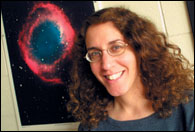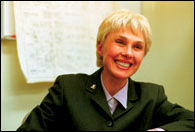Passing the Torch (Page 3)
Big impact
Mogil bluntly assesses the effect that programs such as the Canada Research Chairs and the CFI have had on McGill's ability to attract leading scholars and scientists to the University.
"No way in a million years would McGill be able to make credible offers to some of the top people coming here [without these programs]. The major U.S. universities are willing to plunk down lots of cash to get the people they want."
The inducements extend beyond salaries to significant research support. "It's like night and day," says psychology professor John Abela of the funding currently available to young academics in Canada and the United States.
"Many of the friends I went to grad school with are starting their careers in American universities. With young investigator grants in the U.S., you have to apply again and again and again -- it takes a few years to get even a small grant. I've been able to get almost $1 million in research funding in the three years I've been at McGill. There is absolutely no way that would have happened had I stayed in the U.S."
The chair of Abela's department urged him to apply for CFI funding, "but I was hesitant because I am a social psychologist -- you don't typically need a lot of expensive equipment in my field."
His chair persisted. "He asked what my dream study would be and told me to try for it." Abela wanted 100 handheld computers to distribute to adolescents so they could record information on a daily basis that Abela would use to examine the effects of depression on young people. "I never thought I would get it. I got it."
Physics professor Victoria Kaspi, a recent arrival from MIT, has had a similar experience. "My funding situation is much better here than it was at MIT." There was precious little support for funding graduate students and postdoctoral fellows in the U.S., says Kaspi, who has assembled a team of seven young researchers to collaborate with at McGill, thanks to grants from the Natural Sciences and Engineering Research Council of Canada and other sources.
|
|
 Astrophysics
professor Victoria Kaspi. Astrophysics
professor Victoria Kaspi.PHOTO: Owen Egan |
|
|
|
She, too, had quick success in earning substantial assistance from the CFI. Her team has a $300,000 computer at its disposal, specially equipped to analyze data about Kaspi's area of expertise -- pulsars, a type of neutron star noteworthy for its rapid rotations, radiation bursts and unique magnetic properties.
Recently named one of the country's best young researchers by the Canadian Institute for Advanced Research, Kaspi had other reasons for coming. At MIT, she was part of a deeply stocked astrophysics program. At McGill, Kaspi essentially is the astrophysics program, at least for now. More professors will soon be added and Kaspi will have a hand in selecting them.
"Astrophysics is a growing field," she says. "There are very few major universities in the world without an astrophysics program and McGill was one of them. It was a chance to build something almost from scratch and to know that, 20 years down the road, I played an important role in getting something worthwhile off the ground."
That's the kind of challenge that also lured pathology professor Carolyn Compton to McGill from Harvard. A two-time teaching award winner, Compton headed a research lab that specialized in innovative skin grafts. She and her team wound up in the pages of People magazine when their work saved the lives of two children suffering from massive burns.
McGill offered Compton the chance to rebuild a department that had been particularly hard hit in the '90s by budget cuts and staff departures. Despite her accomplishments, she suspects she wouldn't have had a similar opportunity to put her personal stamp on a department at Harvard for quite some time. "I'm at a point in my career where I can be a leader."
Other attractions
"The quality of our students is also a big selling point," says Price. In the most recent Maclean's magazine ranking of Canadian universities, McGill students place first overall for the number of awards they win.
"I'm amazed and impressed by the quality of the undergraduates here," says Mogil. "I have lots of undergraduates working in my lab and I can tell you that they aren't just washing bottles."
In an interview with the Montreal Gazette, newly hired political scientist Stephen Saideman stated that the quality of the University's students helped convince him to take a pay cut in moving to McGill from Texas Tech University. "I enjoy teaching when the students are interested, thoughtful, and do the work."
While McGill's newest professors hail from places as distant as China and Norway, many are Canadians arriving from positions in other countries, grateful for the chance to return.
"Coming back home was always at the back of my mind," says mechanical engineering professor Pascal Hubert, a Montreal native who left Quebec to do his PhD at the University of British Columbia and then for a job at NASA in the U.S. Hubert devises and analyzes novel methods for developing new forms of composite materials -- lightweight but sturdy metals, for instance.
"I think it's good to go away for a while, to open up your mind to other cultures and other ways of doing things," he says.
 Pathology
professor Carolyn Compton Pathology
professor Carolyn ComptonPHOTO: Owen Egan |
|
|
|
|
Still, when a position opened up at McGill in his area of expertise, Hubert jumped at the chance to return to Montreal. "In terms of the quality of life here, in terms of its affordability, there is no city like Montreal."
"Montreal is so full of character, so inviting," says music theory professor Lloyd Whitesell, another recent arrival. "It's the kind of city you can explore for years."
Whitesell recently co-edited an award-winning book that explored the gay underpinnings and sexual dynamics attached to some famous composers and their compositions. It's the kind of subject matter that made previous employers nervous. "Musicology has a conservative core to it," he explains. "McGill has been so open-minded, so welcoming."
Herself a transplant from the U.K., Deborah Buszard understands the city's appeal. "Our faculty is fortunate to have the McGill name and the Montreal location," says Buszard. "There are few places in the world where you can be a professor of agriculture at a leading university and live in a city as vibrant as Montreal."
Hiring for two
Price says McGill's hiring efforts have gone well so far. "If anything, we've been pleasantly surprised at our ability to attract so many good people so quickly."
But McGill doesn't win every hiring scuffle -- the University of Toronto recently made off with high-profile scientific couple David Kaplan and Freda Miller from the MNI. As Buszard puts it, "We are searching for the best and the brightest and so is every other university out there."
"In some cases, we're paying salaries to new people we never would have thought of paying before," says Carman Miller. "We've had to, to be competitive." Miller is concerned that professors who have already established themselves at McGill often find themselves paid less than newcomers. "I worry that we are creating inequities."
And the University finds itself fretting about things it hadn't considered in the past. These days, accomplished scholars tend to come attached to spouses who have their own career concerns. McGill might look good to the prospective professor, but Montreal isn't always the best fit for her spouse, especially if he can't speak French.
Dr. Grace Egeland is a case in point. Her expertise on the health risks associated with the types of food consumed by aboriginal communities in the North has drawn the attention of national government agencies in Canada and in the U.S.
Egeland, based previously at the University of Bergen in Norway, was a natural fit for McGill's Centre for Indigenous Peoples' Nutrition and Environment (CINE). Egeland was excited at the prospect of joining CINE -- she respects the centre's track record and admires its commitment to carefully consulting native communities about the research it pursues.
But could her husband find a job in Montreal? "It was an important consideration," warrants Egeland. Thankfully, her spouse had the right background for an available job at the Brace Centre for Water Resources Management at Macdonald.
Exciting future
McGill's determination to maintain its international flavour has worked to its benefit. "North America is a very heated market right now," observes Miller. "You can often get very distinguished people from Europe, as well as Asia, Australia, Africa. One of McGill's strongest characteristics is its internationalism. We're trying to reinforce that by bringing people here who have had different sorts of experiences in different places."
"The one thing that we're all committed to is that we won't compromise McGill's academic standards," insists Price.
As hundreds of new professors arrive at McGill, one other thing is certain -- the University won't ever be the same again.
"We have to accept the fact that these people are going to make McGill a much different place than it is today and in ways that we can't yet predict," notes Vinet. "I find that very exciting."


